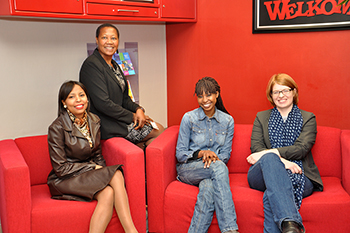Latest News Archive
Please select Category, Year, and then Month to display items
14 June 2024
|
Story Anthony Mthembu
|
Photo Suplied
 Jeremiah Hlahla, a UFS student completing his PhD in Botany at the University of Debrecen as part of an exchange initiative funded by the Erasmus+ Mobility Programme.
Jeremiah Hlahla, a UFS student completing his PhD in Botany at the University of Debrecen as part of an exchange initiative funded by the Erasmus+ Mobility Programme.
As part of an exchange initiative facilitated by the Erasmus+ Mobility Programme, Jeremiah Hlahla, a student at the University of the Free State (UFS), is nearing the completion of his PhD studies at the University of Debrecen in Hungary. Hlahla’s journey, which began in February 2024 and is set to conclude in July 2024, has been a remarkable learning opportunity. “As a first time-traveller to Europe, I have thoroughly enjoyed engaging with people from different countries and cultures,” he said.
The benefits of international collaboration
Hlahla is currently pursuing a PhD in Botany, focusing on plant stress physiology. “My current PhD project investigates the physiological, biochemical and morphological responses of vegetable-type soybean, or edamame, to combined drought and heat stress,’’ he explained. He considers the University of Debrecen the ideal institution to complete his research due to its extensive expertise and resources in similar projects. He noted that his colleagues at Debrecen conduct significant work on plant protection against biotic and abiotic stresses, including salt and drought stress, as well as proteins and amino acids in barley and other legumes.
Given the vast knowledge available on similar projects, Hlahla has found substantial engagement with his work at the University of Debrecen. “Upon arrival, I delivered an introductory lecture presenting my UFS project on the synergistic effects of combined drought and heat stress on the physiology and biochemistry of edamame. It was an engaging session as everyone could relate to my work and asked many questions,’’ he said.
Insights gained from the exchange
Hlahla has also gained valuable lessons that will assist him in his research career, including biotechnology and physiology tools. “I learned how to prepare samples and use high-performance liquid chromatography (HPLC) and reversed-phase ultra-high-performance liquid chromatography (UHPLC) to quantify proteins and amino acids,’’ he said. These techniques are beneficial not only for his current work but will also support future soybean research.
As his experience at the University of Debrecen nears its end, Hlahla reflects on the collaborations and friendships he has formed, which stand out as a significant highlight.
UFS outperforms SA higher education in EU-Saturn programme
2016-12-14

Partnering between the UFS and other institutions
makes it possible for staff and students to study abroad.
Pictured from left front, are: Mareve Biljohn (EU-Saturn
at University of Groningen), Memory Mphaphuli (INSPIRE
at University of Ghent) and Wanda Verster (EU-Saturn at
Uppsala University). Back: Moliehi Mpeli (Erasmus Mundus
at University of Leuven).
Photo: Stephen Collett
The University of the Free State (UFS) strives to invest in its staff and students and a proven example can be seen in the latest cycle of the Erasmus Mundus EU-SATURN programme.
The UFS outperformed the higher education sector over the past five years as it had more exchange scholarships than most South African universities. A total of 16 (18%) out of the 89 local scholarships allocated until 2016 were from UFS. Stellenbosch University, with 14 scholarships, was second.
University one of main roleplayers
Chevon Jacobs, Senior Officer said: “Internationalisation at the UFS is a great achievement as the university allocated all available scholarships to eligible staff and students. She said the strong partnership history between the university and some European institutions, due to a similarity between the language and culture of especially Dutch-speaking countries, is one of the reasons for the success.
“We are very proud of our participation. We have invested for these predominantly young members to spend time abroad in furthering their qualifications,” she said.
The EU-Saturn project has been jointly co-ordinated for the past five years by the University of Groningen, Netherlands, and the UFS.
One of few projects funded by Erasmus Mundus
The Erasmus Mundus is an international partnership aimed at enhancing the quality of European higher education and the promotion of dialogue and understanding between people and cultures through co-operation with other countries. The EUROSA, EU-Saturn, Aesop and INSPIRE to name a few, are all programmes funded by the European Union through the Erasmus Mundus. These projects offer fully funded part-time or full-time postgraduate scholarships for study in Europe.
Some of the universities UFS students have studied at are the University of Groningen, the University of Newcastle, England, and the University of Ghent, Belgium.
Successful UFS grantees awarded scholarships over the past five years:
• Maria Campbell (2014 – PhD) – University of Newcastle
• Sethulego Matebesi (2014 – PhD) – Uppsala University
• Lindie Koorts (2016 – PhD) – University of Groningen
• Reginald Makgoba (2013/2014 – Master’s) – University of Newcastle
• Sanet Steyn (2013/2014 – Master’s) – University of Groningen
• Johnathan Adams (2015/2016 – Master’s) - Göttingen University
• Eben Coetzee (2013/2014 - PhD) – University of Groningen
• André Janse van Rensburg (2013/2014 – PhD) – University of Ghent
• Martin Rossouw (2013-2015 – PhD) – University of Groningen
• Jan Schlebusch (2013-2016 – PhD) – University of Groningen
• Carel Cloete (2014-2016 – PhD) – University of Groningen
• Nadine Lake (2014-2016 – PhD) – Uppsala University
• Elbie Lombard (2014-2016 – PhD) – University of Ghent
• Luyanda Noto (2014/2015 – PhD) – University of Ghent
• Mareve Biljohn (2015/2016 – PhD) – University of Groningen
• Wanda Verster (2015/2016 – PhD) – Uppsala University